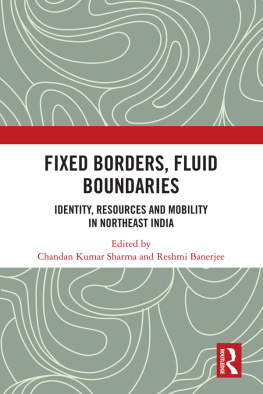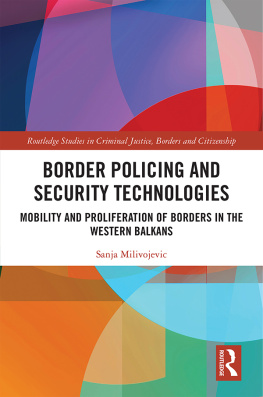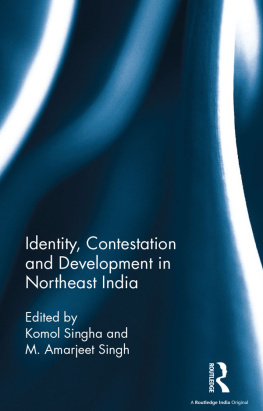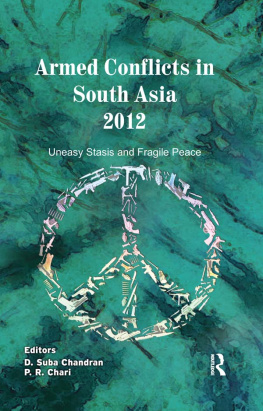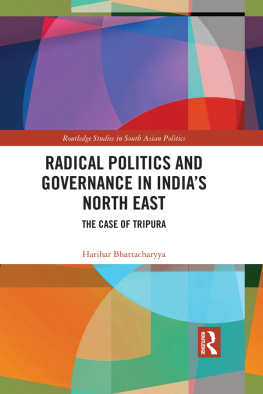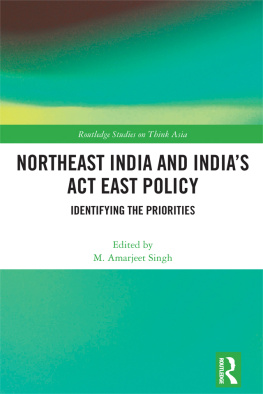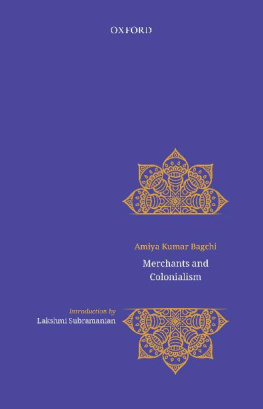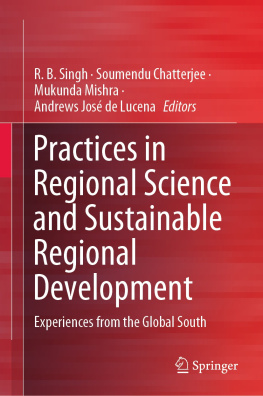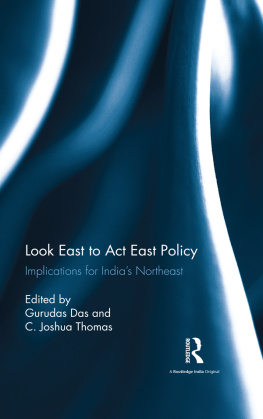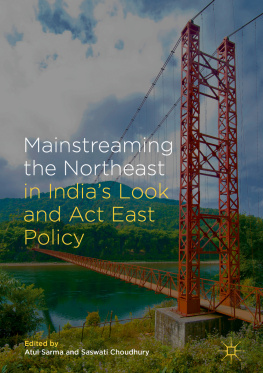Fixed Borders, Fluid Boundaries
This book provides an understanding of the challenges in Northeast India in terms of the nature of flows and ruptures in the daily lives of people. It brings together multiple and interconnected issues of identity, development, environment, migration, land alienation and policy impacts to the forefront.
Northeast Indias history is affected both by internal dynamic processes, as are its linkages with adjoining countries, marked by a fluid movement of people and goods across porous borders. The book explores how the region has emerged as a resource frontier for the global markets, yet its resource mobilization has led to disparity within the region. The volume discusses key themes concerning the region such as the processes of development and peoples resistance; underdevelopment in the peripheral areas; resource flow and conflict; community response and local agency; state and customary practices; politics of land and citizenship; development-induced dispossession; human mobility, immigration and conflict; the notion of outsiders; interstate border conflict; and spatial connections.
Rich in empirical data, the volume will be relevant and useful for students and researchers of development studies, Northeast India studies, sociology, political science, border and migration studies, public policy, peace and conflict studies, as well as practitioners and policymakers.
Chandan Kumar Sharma is Professor of Sociology at Tezpur University, Assam, India.
Reshmi Banerjee is a political scientist based in London, UK, and is currently a visiting research fellow at the Institute of Social Sciences, New Delhi, India.
First published 2021
by Routledge
2 Park Square, Milton Park, Abingdon, Oxon OX14 4RN
and by Routledge
52 Vanderbilt Avenue, New York, NY 10017
Routledge is an imprint of the Taylor & Francis Group, an informa business
2021 selection and editorial matter, Chandan Kumar Sharma and Reshmi Banerjee; individual chapters, the contributors
The right of Chandan Kumar Sharma and Reshmi Banerjee to be identified as the authors of the editorial material, and of the authors for their individual chapters, has been asserted in accordance with sections 77 and 78 of the Copyright, Designs and Patents Act 1988.
All rights reserved. No part of this book may be reprinted or reproduced or utilised in any form or by any electronic, mechanical, or other means, now known or hereafter invented, including photocopying and recording, or in any information storage or retrieval system, without permission in writing from the publishers.
Trademark notice: Product or corporate names may be trademarks or registered trademarks, and are used only for identification and explanation without intent to infringe.
British Library Cataloguing-in-Publication Data
A catalogue record for this book is available from the British Library
Library of Congress Cataloging-in-Publication Data
A catalog record for this book has been requested
ISBN: 978-0-367-42899-0 (hbk)
ISBN: 978-1-003-00003-7 (ebk)
Typeset in Sabon
by Apex CoVantage, LLC
Contents
CHANDAN KUMAR SHARMA AND RESHMI BANERJEE
PART 1
Discord around development
BINOD BHATTARAI
KITDOR W. KHARBULI
SHREYA SAHA
DOLA BORKATAKI
PART 2
Issues of identity
JAGRITEE GHOSH
CIHNNITA BARUAH
SABA SHARMA
FARIBA ALAMGIR
PART 3
Borders and beyond
N. WILLIAM SINGH
PRAFULLA KR. NATH
RESHMI BANERJEE
KAUSTUBH DEKA
Guide
Fariba Alamgir is a postdoctoral research associate at the Centre for Development Studies, Department of Social and Policy Sciences, University of Bath, and an external associate at the School of International Development, University of East Anglia, UK. She holds a PhD in International Development from the University of Copenhagen and University of East Anglia. She has taught anthropology as a lecturer at University of Dhaka, Bangladesh. Her areas of research include politics of resource scarcity and access, property rights, governance and state formation, identity, marginalization and inequality in the context of peoples struggles over rights and entitlements. She has also worked on environmental disaster, climate change, livelihood and health security issues focusing on understanding vulnerability and resilience of rural population.
Reshmi Banerjee is a political scientist based in London, UK, and is currently a visiting research fellow at the Institute of Social Sciences, New Delhi, India. She was previously an academic visitor at the Asian Studies Centre, St Antonys College (Oxford), a research associate at SOAS University of London, a postdoctoral fellow at the University of Indonesia and a researcher in the Indonesian Institute of Sciences (LIPI). She has been a visiting professor in Jamia Millia Islamia and a fellow in the Rajiv Gandhi Institute for Contemporary Studies and has taught at Delhi University and the University of Indonesia. She completed her MA, MPhil and PhD from the Centre for Political Studies, Jawaharlal Nehru University, New Delhi. With a specialization in food security, agricultural policies and cross-border studies on the Indo-Myanmar region, she is the author of Land Conflicts across Frontiers: Contested Spaces in Myanmar and North East India (2018), and has co-edited two books: Gender, Poverty and Livelihood in the Eastern Himalayas (2017) and Climate Change in the Eastern Himalaya: Impact on Livelihoods, Growth and Poverty (2015). She is currently pursuing another masters in museum cultures from Birkbeck, University of London.
Cihnnita Baruah is a doctoral research scholar at the Centre for the Study of Law and Governance, Jawaharlal Nehru University (JNU), New Delhi, India. She has an MPhil from JNU and has completed her graduation and postgraduation in political science from Indraprastha College for Women, University of Delhi. Her interest areas include the Northeast, ethnicity, identity politics and conflict studies.
Binod Bhattarai is Assistant Professor at the Department of Sociology, Sikkim University, Gangtok, India. His research interest is in the Himalayan region of Sikkim, Bhutan and Nepal with a particular focus on emerging social inequality, political dynamics, social movements, ethnic identity and relations, ecology and environment. He obtained his MPhil and PhD from Pondicherry Central University and obtained a masters in sociology from Banaras Hindu University, Varanasi.
Dola Borkataki is Assistant Professor in the Department of Sociology, K.K. Handiqui State Open University, Guwahati, Assam, India. She is also pursuing a PhD from the Department of Sociology, Tezpur Central University. Her research interests are in the areas of economic sociology, sociology of development, political sociology, issues of ethnicity and identity. She has written a number of research papers/articles in journals and books. She has also presented her work in several seminars, including one in the Third ISA Forum of Sociology, organized by the International Sociological Association, in the University of Vienna (2016).
Kaustubh Deka is Assistant Professor at the Department of Political Science, Dibrugarh University, Assam, India. Formerly he taught at the Centre for North East Studies and Policy Research, Jamia Millia Islamia, New Delhi. He has also been a fellow at the Hindu Centre for Politics and Public Policy, Chennai, and holds a doctorate from the School of Social Science, Jawaharlal Nehru University, New Delhi. His academic interest includes issues of ecological politics in Northeast India, trends of youth politics and identity assertion in the region as well as inquiries into understanding the category of Northeast India.

